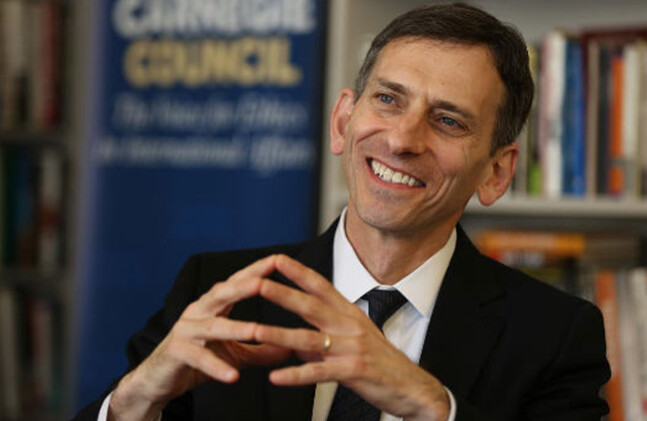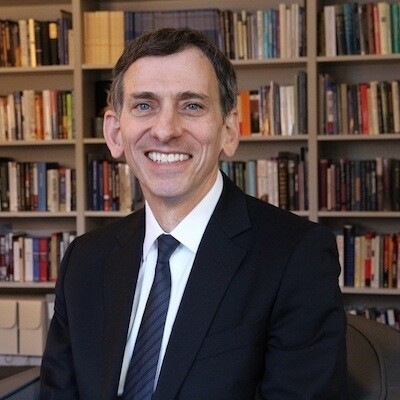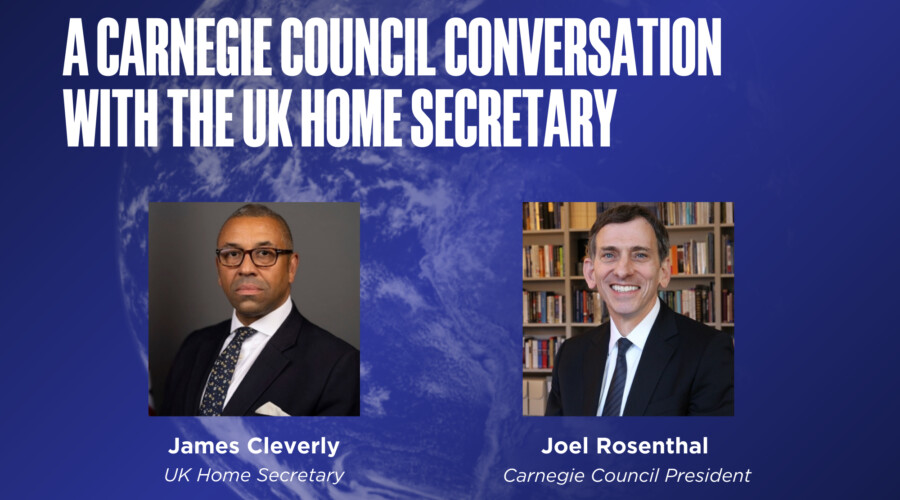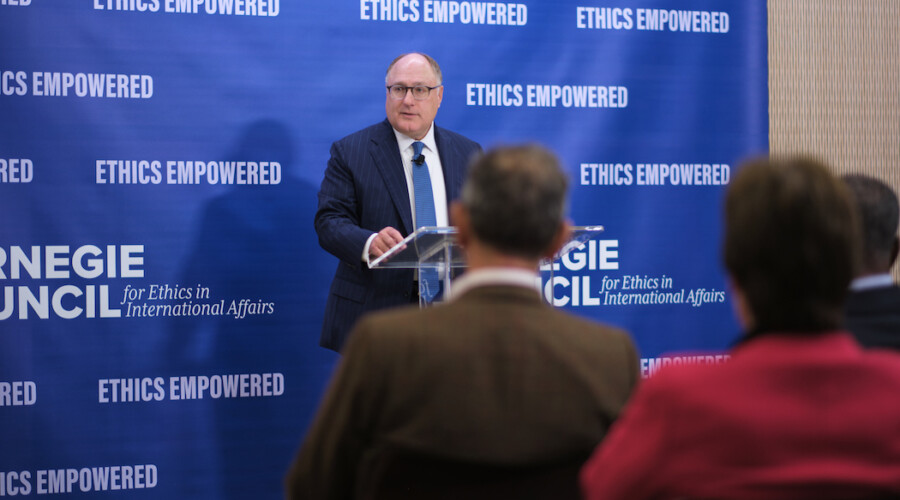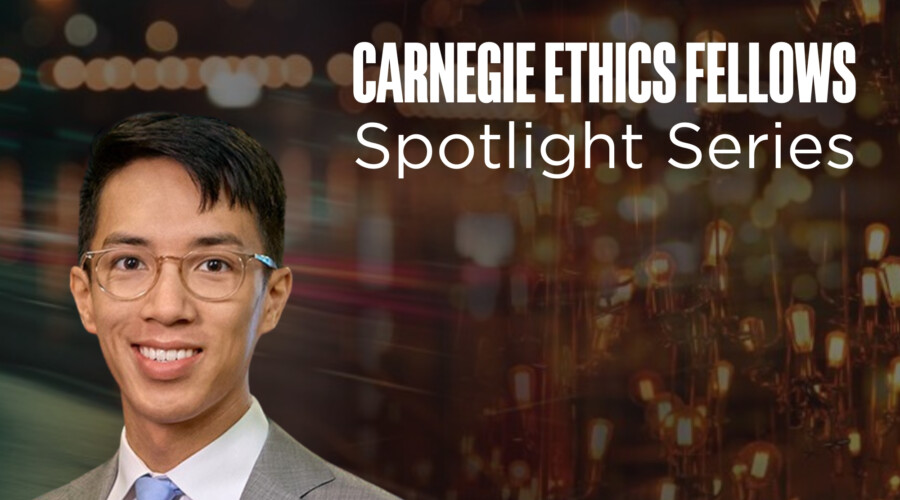Carnegie Council President Joel Rosenthal read this letter to assembled guests at Carnegie Council's Centennial dinner, October 16, 2014.
At the beginning of our hundredth year, I wrote a letter to Andrew Carnegie, reporting on the progress of our Council and the prospects for the more peaceful world that he so fervently desired. Tonight I'd like to pivot sharply and share with you a brief letter to the future. With any luck, maybe our successors will find it, time-capsule style, as they prepare for the Council's bi-centennial in 2114.
Here it is, my brief letter to the future:
Dear friends,
As you read this in the year 2114, we write to you from the vantage point of the Autumn of 2014. The issues before us are challenging—climate change, extreme poverty, financial, racial, and gender inequality, intractable religious and ethnic conflict, terrorism, the persistence of bigotry and hatred—all are urgent concerns.
Can we really say that these challenges are more difficult than those that faced our predecessors? I don't think so. Slavery, imperialism, racism, wars of conquest, all commonplace in Andrew Carnegie's lifetime, are now universally recognized as illegitimate and unjust.
Extreme poverty on the decline, literacy up, and amazing advances in science and technology are opening new frontiers in health, information, and energy. Yet, despite genuine moral and material progress, we feel unease in these closing months of 2014.
Rejectionists make their presence felt dramatically with acts of gratuitous violence. International institutions inspired by great idealism are subverted by the realities of power politics. Global cooperation, even around an immediate threat like epidemic disease, remains elusive. Democratic revival, so promising in its aspiration, springs up then stalls and is sometimes reversed.
We see now with great clarity that our era is the era of globalization. We recognize that our most basic human needs—health, security, jobs—are now fully embedded in global systems. There's no escape.
We see now that it is time to be purposeful about articulating an ethics for a connected world—a global ethic, if you will. This is what we've set out to do in our centennial year, to begin a series of global ethical dialogues, to stimulate debate about the moral aspects of living in a globalized world. For a global ethic to have any impact, finding common interests supported by common human values will be the key.
We're realists. We know that interests collide, struggles for power will persist, different views of what is desirable and good will remain irreconcilable in our time and in yours. For us, ethics cannot be solely about convergence, it must also be about divergence—living peacefully, even exuberantly with differences.
Thanks to digital technology, it is now possible for Carnegie Council to produce and direct the multidirectional global conversation that is needed to explore the possibilities and limits of this so-called global ethic.
Our New York studio and our Global Ethics Network of fellows are an invaluable public trust. With these tools, studio and network, we are convening, publishing, and broadcasting programs to reach hundreds of thousands, if not millions, of people around the world.
In doing so, we are extending the hundred-year experiment in mutual learning. We are creating a Carnegie channel for global public affairs programming and, in a sense, a new Carnegie library of easily retrievable multimedia resources to benefit our generation and yours.
On this occasion, we brought together many of our global ethics fellows and their students who are contributing to this effort. They, along with our partners and over 50 colleges and universities and international organizations around the world, engaged today in our first Global Ethics Day.
Global Ethics Day was conceived as a series of open dialogues and conversations linked by the Carnegie Council's theme of Ethics For A Connected World and structured by the idea that ethical inquiry is best rooted in local experiences and communities. These conversations will continue as a cornerstone of Carnegie Council activities in the future, as we pursue our traditional educational mission and new and innovative ways. The high reputation and power of attraction represented in these programs is a trust that we are proud to pass along to our successors.
In that spirit, we are pleased this week to launch the Robert J. Myers Fellows Fund in memory of my predecessor, Robert Myers. The fund will support a range of fellow's activities in their local communities. By empowering our fellows in their home regions and institutions, the Council's work will be multiplied and enriched immeasurably.
With the generosity of the Myers family and our 2014 centennial founders, we're reminded of the power of personal connection and commitment. There is simply no substitute for it.
With our 12 Founders, our generation is doing its part to support this work, connecting past to present to future. Each of our Centennial Founders has made an invaluable contribution, supporting programs including lectures, seminars, broadcasts, webcasts, publications, supporting people including our Senior Fellows, Global Ethics Fellows, Ethics Fellows for the Future, and our professional staff, supporting projects such as our Global Ethical Dialogues in the United States, Europe, South America, and Asia, and supporting our studio and offices on East 64th Street.
We have been unusually lucky in the people who have been so generous and energetic and creative in their support. May this luck continue and be redoubled over the next 100 years.
In closing, we write this letter, marking our 100th anniversary, mindful of the Carnegie legacy—a legacy that connects us to great movements for peace, social justice, scientific progress, education, and artistic expression. That scope is so ambitious and inspiring.
It is not always easy to make the pitch for progress when we see one international catastrophe after another and the persistence of pain and suffering for so many, even now in the second decade of the 21st Century. It often seems like one step forward, two steps back, but without such efforts, we might easily slide from skepticism to cynicism and, ultimately, to despair.
In the face of so many challenges, the Council remains, in 2014, a place where we can keep imagining a better future. May it continue to be that place for you in 2114 and for our successors in the future. The letter is signed for me, but I hope it's on behalf of all of you.
As you can tell from these remarks, we will continue our work with optimism and realism, with a sense that educational efforts like ours are a great responsibility, a great opportunity, and a great privilege.
Sincerely,
Joel Rosenthal
